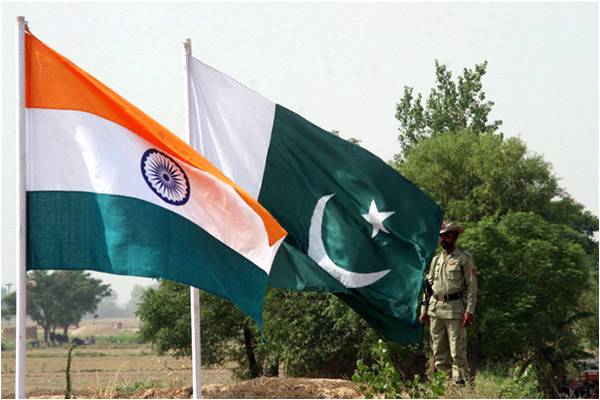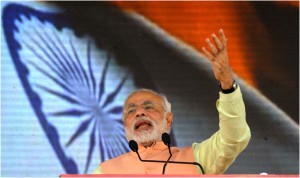
Narendera Modi’s phenomenal success nearly stunned almost all political pundits even including his rivals such as Lalu Prasad Yadev and Deve Gowda – who vowed to change their names or leave Karnataka if Modi won. This has also prompted alarmists in Pakistan to warn of political polarization in India. They are also forecasting difficult times ahead for the non-BJP segments of the society. Right-wing radicals in Pakistan even jumped to the conclusion that Modi’s election as prime minister amounted to an affirmation of the two-nation theory.
Outsiders also look at Modi’s success as a rebuff to those who had expected India to shake off the traditional socio-political structures such as the cast system and communalism in order to conform to a western ideal of liberal democracy and capitalism.
“For more than two decades that possibility has faced a pincer movement: a form of global capitalism that can only enrich a small minority and a xenophobic nationalism that handily identifies fresh scapegoats for large-scale socio-economic failure and frustration,” wrote the Guardian’s Pankaj Mishra.
[quote]Modi is a lifelong ember of the RSS, a aramilitary Hindu organization inspired by fascist movements of Europe[/quote]
Many also believe Modi would treat Pakistan as his preferred “scarecrow” to consolidate his hold on power. They peddle the argument that Modi would need a “bad guy next door” to whip up a nationalistic frenzy and stoke tensions beyond those triggered by Kargil conflict in 1999 and the Mumbai 2007 attacks. Underlying this discourse is the presumption that Modi would continue acting like a regional chief minister.
His landslide victory has also prompted analysts to ask whether with the rise of a Hindu nationalist Narendra Modi to the topmost slot, the world’s largest democracy is entering its most sinister period since independence (The Guardian, May 16), when nobody would have imagined such a victory for a person who is a lifelong member of the Rashtriya Swayamsevak Sangh (RSS), “a paramilitary Hindu nationalist organisation inspired by the fascist movements of Europe, whose founder’s belief that Nazi Germany had manifested ‘race pride at its highest’ by purging the Jews, is by no means unexceptional among the votaries of Hindutva, or ‘Hinduness’.”
Others, however, point to the BJP’s election manifesto which emphasises “the need to pursue friendly relations in India’s immediate neighbourhood, with a view to rebranding India through increased trade and technology. In a display of policy pragmatism, the BJP has wedded the quest for political stability, progress and peace in South Asia to India’s growth and development, creating the possibility of constructive engagement with its hostile neighbour through economic linkages,” writes Manaswini Ramkumar in a RSIS commentary.
[quote]Islamabad cannot afford to be seen as the embodiment of the cloak-and-dagger dictum any more[/quote]
Regardless of his conduct, we must accept Modi as the expression of India’s majority population – at least those who bothered to queue up for casting their vote. They have spoken for man whom his rivals ostracized and derided for his saffron nationalism. The big challenge for the world is now how to adjust to a leader (whom the United States denied visa for his communal politics), and who publicly spoke of rubbing off Article 370 of the Indian constitution (a consequence of Kashmir being the unfinished agenda of the United Nations). Modi caused alarm even in Bangladesh by vowing to throw Bengali immigrants out of India.
Undeterred by what critics say about him, Modi has already spoken of his intentions of an inclusive governance model focused on economic development. How the BJP-RSS brigades will wed these foreign policy objectives with their ascendant domestic communal politics wrapped in the quest for a Hindu-led modernity.

For Pakistan too, a Modi-led government represents an extremely formidable challenge. His spokespersons and aides have already articulated their intention of talking tough on terrorist infrastructure with Pakistan.
In the first place, Pakistanis need to be as confident as the nationalist Modi sounds. A Sharif-Sharif-led Pakistan does not have to poke fun at the communal or caste side of India, nor must they invoke historical instances such as the two-nation theory to justify cold-war era policies. Dialogue among nations today is anchored in the quest for political autonomy as well as commercial linkages that guarantees economic and commercial growth at home.
Secondly, while being confident of their intent for constructive relations with India, the Pakistani leadership does not need to wait for an initiative by Modi or to see his performance at home or his treatment of Muslims in India. Concern for human rights anywhere in the world is legitimate but Pakistanis need to care more about the majority and minority rights at home rather than bemoan “mistreatment” of their ideological soulmates elsewhere.
Thirdly, current conditions dictate that Pakistan embed its dialogue with India in modern realpolitik rather than in an ideology that is being torn apart by the commercial greed of industry, including the electronic media, and exploited by political forces of status quo. Pakistanis also need to shun those forces who still use the metaphor of the two-nation theory to justify their opposition to normalization of relations with India.
Fourth, the Pakistani leadership must realize that the test of its intent for friendly relations the new Indian government will rest on the January 2004 Islamabad declaration, which had committed Pakistan not to allow its territory to be used for terrorism against India.
Rather than allowing non-state actors utilize precious print and electronic media space for India or US-bashing, the Pakistani state needs to devise a wholistic approach for setting its foreign policy right; the civilians, and the entire security apparatus must sit together and involve other key stakeholders such as PEMRA and major media houses to synchronize Pakistan’s foreign policy. Islamabad cannot afford to be seen as the embodiment of the “cloak and dagger” dictum any more. It needs to embrace pragmatism that is needed to deal with its multiple crises and to regain confidence of the global community.
Outsiders also look at Modi’s success as a rebuff to those who had expected India to shake off the traditional socio-political structures such as the cast system and communalism in order to conform to a western ideal of liberal democracy and capitalism.
“For more than two decades that possibility has faced a pincer movement: a form of global capitalism that can only enrich a small minority and a xenophobic nationalism that handily identifies fresh scapegoats for large-scale socio-economic failure and frustration,” wrote the Guardian’s Pankaj Mishra.
[quote]Modi is a lifelong ember of the RSS, a aramilitary Hindu organization inspired by fascist movements of Europe[/quote]
Many also believe Modi would treat Pakistan as his preferred “scarecrow” to consolidate his hold on power. They peddle the argument that Modi would need a “bad guy next door” to whip up a nationalistic frenzy and stoke tensions beyond those triggered by Kargil conflict in 1999 and the Mumbai 2007 attacks. Underlying this discourse is the presumption that Modi would continue acting like a regional chief minister.
His landslide victory has also prompted analysts to ask whether with the rise of a Hindu nationalist Narendra Modi to the topmost slot, the world’s largest democracy is entering its most sinister period since independence (The Guardian, May 16), when nobody would have imagined such a victory for a person who is a lifelong member of the Rashtriya Swayamsevak Sangh (RSS), “a paramilitary Hindu nationalist organisation inspired by the fascist movements of Europe, whose founder’s belief that Nazi Germany had manifested ‘race pride at its highest’ by purging the Jews, is by no means unexceptional among the votaries of Hindutva, or ‘Hinduness’.”
Others, however, point to the BJP’s election manifesto which emphasises “the need to pursue friendly relations in India’s immediate neighbourhood, with a view to rebranding India through increased trade and technology. In a display of policy pragmatism, the BJP has wedded the quest for political stability, progress and peace in South Asia to India’s growth and development, creating the possibility of constructive engagement with its hostile neighbour through economic linkages,” writes Manaswini Ramkumar in a RSIS commentary.
[quote]Islamabad cannot afford to be seen as the embodiment of the cloak-and-dagger dictum any more[/quote]
Regardless of his conduct, we must accept Modi as the expression of India’s majority population – at least those who bothered to queue up for casting their vote. They have spoken for man whom his rivals ostracized and derided for his saffron nationalism. The big challenge for the world is now how to adjust to a leader (whom the United States denied visa for his communal politics), and who publicly spoke of rubbing off Article 370 of the Indian constitution (a consequence of Kashmir being the unfinished agenda of the United Nations). Modi caused alarm even in Bangladesh by vowing to throw Bengali immigrants out of India.
Undeterred by what critics say about him, Modi has already spoken of his intentions of an inclusive governance model focused on economic development. How the BJP-RSS brigades will wed these foreign policy objectives with their ascendant domestic communal politics wrapped in the quest for a Hindu-led modernity.

For Pakistan too, a Modi-led government represents an extremely formidable challenge. His spokespersons and aides have already articulated their intention of talking tough on terrorist infrastructure with Pakistan.
In the first place, Pakistanis need to be as confident as the nationalist Modi sounds. A Sharif-Sharif-led Pakistan does not have to poke fun at the communal or caste side of India, nor must they invoke historical instances such as the two-nation theory to justify cold-war era policies. Dialogue among nations today is anchored in the quest for political autonomy as well as commercial linkages that guarantees economic and commercial growth at home.
Secondly, while being confident of their intent for constructive relations with India, the Pakistani leadership does not need to wait for an initiative by Modi or to see his performance at home or his treatment of Muslims in India. Concern for human rights anywhere in the world is legitimate but Pakistanis need to care more about the majority and minority rights at home rather than bemoan “mistreatment” of their ideological soulmates elsewhere.
Thirdly, current conditions dictate that Pakistan embed its dialogue with India in modern realpolitik rather than in an ideology that is being torn apart by the commercial greed of industry, including the electronic media, and exploited by political forces of status quo. Pakistanis also need to shun those forces who still use the metaphor of the two-nation theory to justify their opposition to normalization of relations with India.
Fourth, the Pakistani leadership must realize that the test of its intent for friendly relations the new Indian government will rest on the January 2004 Islamabad declaration, which had committed Pakistan not to allow its territory to be used for terrorism against India.
Rather than allowing non-state actors utilize precious print and electronic media space for India or US-bashing, the Pakistani state needs to devise a wholistic approach for setting its foreign policy right; the civilians, and the entire security apparatus must sit together and involve other key stakeholders such as PEMRA and major media houses to synchronize Pakistan’s foreign policy. Islamabad cannot afford to be seen as the embodiment of the “cloak and dagger” dictum any more. It needs to embrace pragmatism that is needed to deal with its multiple crises and to regain confidence of the global community.

